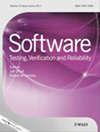A mapping study on mutation testing for mobile applications
IF 1.2
4区 计算机科学
Q3 COMPUTER SCIENCE, SOFTWARE ENGINEERING
引用次数: 3
Abstract
The use of mutation testing for mobile applications (apps for short) is still a challenge. Mobile apps are usually event‐driven and encompass graphical user interfaces (GUIs) and a complex execution environment. Then, they require mutant operators to describe specific apps faults, and the automation of the mutation process phases like execution and analysis of the mutants is not an easy task. To encourage research addressing such challenges, this paper presents results from a mapping study on mutation testing for mobile apps. Following a systematic plan, we found 16 primary studies that were analysed according to three aspects: (i) trends and statistics about the field; (ii) study characteristics such as focus, proposed operators and automated support for the mutation testing phases; and (iii) evaluation aspects. The great majority of studies (98%) have been published in the last 3 years. The most addressed language is Java, and Android is the only operating system considered. Mutant operators of GUI and configuration types are prevalent in a total of 138 operators found. Most studies implement a supporting tool, but few tools support mutant execution and analysis. The evaluation conducted by the studies includes apps mainly from the finance and utility domain. Nevertheless, there is a lack of benchmarks and more rigorous experiments. Future research should address other specific types of faults, languages, and operating systems. They should offer support for mutant execution and analysis, as well as to reduce the mutation testing cost and limitations in the mobile context.移动应用程序突变检测的映射研究
在移动应用程序(简称应用程序)中使用突变测试仍然是一个挑战。手机应用通常是事件驱动的,包含图形用户界面(gui)和复杂的执行环境。然后,他们要求突变操作人员描述特定的应用程序故障,而执行和分析突变等突变过程阶段的自动化并不是一件容易的事。为了鼓励解决这些挑战的研究,本文介绍了一项针对移动应用程序突变测试的映射研究的结果。根据系统计划,我们找到了16项主要研究,并根据三个方面进行了分析:(i)该领域的趋势和统计数据;(ii)研究特征,例如突变测试阶段的重点、建议的操作人员和自动化支持;(三)评价方面。绝大多数研究(98%)是在最近3年内发表的。最受关注的语言是Java, Android是唯一考虑的操作系统。GUI和配置类型的突变操作符在总共138个操作符中很普遍。大多数研究实现了一个支持工具,但很少有工具支持突变的执行和分析。本研究进行的评估主要包括来自金融和公用事业领域的应用程序。然而,缺乏基准和更严格的实验。未来的研究应该解决其他特定类型的故障、语言和操作系统。它们应该为突变的执行和分析提供支持,以及减少突变测试的成本和在移动环境中的限制。
本文章由计算机程序翻译,如有差异,请以英文原文为准。
求助全文
约1分钟内获得全文
求助全文
来源期刊

Software Testing Verification & Reliability
工程技术-计算机:软件工程
CiteScore
3.70
自引率
0.00%
发文量
34
审稿时长
>12 weeks
期刊介绍:
The journal is the premier outlet for research results on the subjects of testing, verification and reliability. Readers will find useful research on issues pertaining to building better software and evaluating it.
The journal is unique in its emphasis on theoretical foundations and applications to real-world software development. The balance of theory, empirical work, and practical applications provide readers with better techniques for testing, verifying and improving the reliability of software.
The journal targets researchers, practitioners, educators and students that have a vested interest in results generated by high-quality testing, verification and reliability modeling and evaluation of software. Topics of special interest include, but are not limited to:
-New criteria for software testing and verification
-Application of existing software testing and verification techniques to new types of software, including web applications, web services, embedded software, aspect-oriented software, and software architectures
-Model based testing
-Formal verification techniques such as model-checking
-Comparison of testing and verification techniques
-Measurement of and metrics for testing, verification and reliability
-Industrial experience with cutting edge techniques
-Descriptions and evaluations of commercial and open-source software testing tools
-Reliability modeling, measurement and application
-Testing and verification of software security
-Automated test data generation
-Process issues and methods
-Non-functional testing
 求助内容:
求助内容: 应助结果提醒方式:
应助结果提醒方式:


